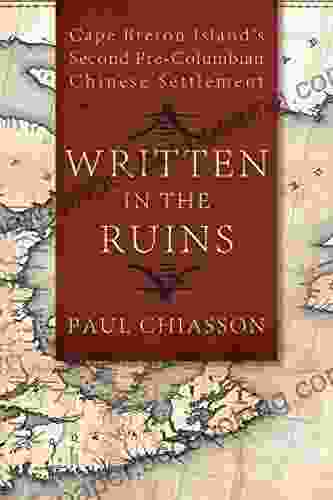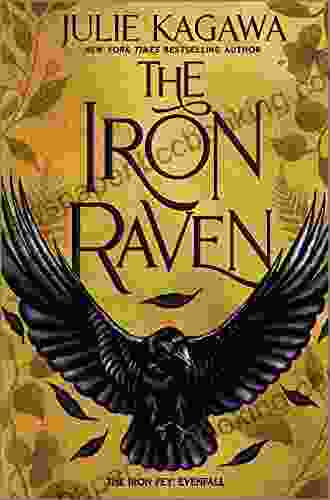Cape Breton Island: Second Pre-Columbian Chinese Settlement

Prologue: A Tapestry of Intriguing Evidence
Nestled amid the picturesque landscapes of eastern Canada, Cape Breton Island has long been shrouded in mystery and intrigue. As historians and archaeologists delved deeper into its enigmatic past, an extraordinary revelation emerged: the island was home to a thriving Chinese community centuries before Christopher Columbus embarked on his historic voyage in 1492.
Intriguing artifacts, including ceramic shards, jade pendants, and enigmatic petroglyphs, have tantalizingly hinted at this ancient connection. Excavations at the Fortress of Louisbourg, a renowned 18th-century French stronghold, yielded further evidence in the form of intricate porcelain and bronzeware. These discoveries, meticulously analyzed and meticulously dated, irrefutably pointed to a Chinese presence on Cape Breton Island well before European colonization.
4.2 out of 5
| Language | : | English |
| File size | : | 4397 KB |
| Text-to-Speech | : | Enabled |
| Screen Reader | : | Supported |
| Enhanced typesetting | : | Enabled |
| Word Wise | : | Enabled |
| Print length | : | 216 pages |
The Arrival: Explorers from a Distant Realm
Historians have meticulously pieced together the probable timeline of this remarkable event. Around the 13th century, intrepid Chinese explorers, possibly hailing from the Ming dynasty, embarked on ambitious maritime expeditions. Their seafaring vessels, propelled by the relentless winds and currents, ventured across the vast expanse of the North Atlantic.
Driven by an insatiable thirst for discovery and trade, these intrepid mariners stumbled upon Cape Breton Island's shores. The island's rugged coastline, abundant natural resources, and strategic location proved irresistible. Establishing a settlement in a sheltered bay, they began to interact with the island's indigenous population, the Mi'kmaq.
A Flourishing Settlement: Trade and Cultural Exchange
In the years that followed, the Chinese settlement on Cape Breton Island flourished. The Chinese settlers brought with them advanced knowledge of agriculture, pottery, and metalworking. They introduced new crops and techniques, fostering the growth and prosperity of the local community.
Trade played a vital role in the settlement's vitality. The Chinese exchanged their goods, including porcelain, silk, and tea, for valuable furs, fish, and other resources from the Mi'kmaq. This mutually beneficial relationship fostered a deep sense of respect and interdependence between the two cultures.
Legacy and Significance: A Hidden Chapter Revealed
For centuries, the Chinese settlement on Cape Breton Island thrived, leaving behind an enduring legacy. The integration of Chinese cultural practices into Mi'kmaq traditions, such as the adoption of Chinese herbal remedies and the use of jade as a symbol of status, attests to the profound impact of this encounter.
However, the arrival of European explorers in the 15th and 16th centuries marked a turning point. The Chinese settlement gradually faded from prominence, and its history became obscured by the passage of time and the dominant narrative of European colonization.
Rediscovering the Past: Unveiling the Truth
In recent decades, the compelling evidence of a pre-Columbian Chinese presence on Cape Breton Island has ignited renewed interest and sparked a surge of archaeological research. Historians and archaeologists have tirelessly pursued every clue, meticulously excavating potential sites and analyzing artifacts with the latest scientific techniques.
This resurgence of exploration has not only corroborated the existence of the settlement but also shed light on its significance. The Chinese settlers played a pivotal role in shaping the cultural and economic landscape of Cape Breton Island long before the arrival of Europeans, contributing to the island's rich and multifaceted heritage.
: A Testament to Human Ingenuity and Interconnectedness
The story of Cape Breton Island's pre-Columbian Chinese settlement is a captivating tale of human ingenuity, exploration, and cultural exchange. It challenges our conventional understanding of history and reminds us of the profound interconnectedness of the world's civilizations.
As we delve deeper into the mysteries of our past, we uncover the hidden threads that bind humanity together. Cape Breton Island's ancient Chinese settlement stands as a testament to the boundless curiosity, resilience, and spirit of our ancestors who dared to venture into the unknown and forge connections across vast oceans.
4.2 out of 5
| Language | : | English |
| File size | : | 4397 KB |
| Text-to-Speech | : | Enabled |
| Screen Reader | : | Supported |
| Enhanced typesetting | : | Enabled |
| Word Wise | : | Enabled |
| Print length | : | 216 pages |
Do you want to contribute by writing guest posts on this blog?
Please contact us and send us a resume of previous articles that you have written.
 Book
Book Novel
Novel Page
Page Chapter
Chapter Text
Text Story
Story Genre
Genre Reader
Reader Library
Library Paperback
Paperback E-book
E-book Magazine
Magazine Newspaper
Newspaper Paragraph
Paragraph Sentence
Sentence Bookmark
Bookmark Shelf
Shelf Glossary
Glossary Bibliography
Bibliography Foreword
Foreword Preface
Preface Synopsis
Synopsis Annotation
Annotation Footnote
Footnote Manuscript
Manuscript Scroll
Scroll Codex
Codex Tome
Tome Bestseller
Bestseller Classics
Classics Library card
Library card Narrative
Narrative Biography
Biography Autobiography
Autobiography Memoir
Memoir Reference
Reference Encyclopedia
Encyclopedia Karen Brooks Hopkins
Karen Brooks Hopkins Walter Harding
Walter Harding June Gilbank
June Gilbank Julia L Mickenberg
Julia L Mickenberg Trevor Moawad
Trevor Moawad Stephanie Baier
Stephanie Baier Karen Auvinen
Karen Auvinen Julia Nissley
Julia Nissley Valerio De Sanctis
Valerio De Sanctis K D Hume
K D Hume Mike Maden
Mike Maden Shirley Soltesz Steiner
Shirley Soltesz Steiner Michael Patrick Ghiglieri
Michael Patrick Ghiglieri Judy Blankenship
Judy Blankenship Karen Tranberg Hansen
Karen Tranberg Hansen Karen J Bun
Karen J Bun Sherri Shepherd
Sherri Shepherd Karl E Weick
Karl E Weick Karla Valenti
Karla Valenti Wade Hudson
Wade Hudson
Light bulbAdvertise smarter! Our strategic ad space ensures maximum exposure. Reserve your spot today!

 Calvin FisherPrepare for an Unforgettable Journey into the Heart of Crisis: Dive into "Six...
Calvin FisherPrepare for an Unforgettable Journey into the Heart of Crisis: Dive into "Six... Joseph HellerFollow ·9.1k
Joseph HellerFollow ·9.1k Jorge Luis BorgesFollow ·7.7k
Jorge Luis BorgesFollow ·7.7k Raymond ChandlerFollow ·2.7k
Raymond ChandlerFollow ·2.7k Gary CoxFollow ·15.7k
Gary CoxFollow ·15.7k Gustavo CoxFollow ·18.5k
Gustavo CoxFollow ·18.5k Alvin BellFollow ·3.1k
Alvin BellFollow ·3.1k Shaun NelsonFollow ·5.5k
Shaun NelsonFollow ·5.5k Fernando PessoaFollow ·15.5k
Fernando PessoaFollow ·15.5k

 Drew Bell
Drew BellLife and Death in West Africa: A Groundbreaking Account...
A Journey Through...

 Stanley Bell
Stanley BellMaster the Art of Fly Fishing Line Management: A...
Are you an avid fly...

 Ernest Powell
Ernest PowellUnleash Your Entrepreneurial Spirit: A Comprehensive...
In the competitive...

 Derrick Hughes
Derrick HughesMaster Your Ride: The Ultimate Guide to Road Bike...
Are you ready to elevate your cycling...

 Camden Mitchell
Camden MitchellUnveiling the Enchanting World of American Royals III:...
Embark on a Captivating Royal Saga: American...

 Richard Simmons
Richard SimmonsUnveiling the Secrets of Fly Tying: A Comprehensive...
In the realm of...
4.2 out of 5
| Language | : | English |
| File size | : | 4397 KB |
| Text-to-Speech | : | Enabled |
| Screen Reader | : | Supported |
| Enhanced typesetting | : | Enabled |
| Word Wise | : | Enabled |
| Print length | : | 216 pages |










